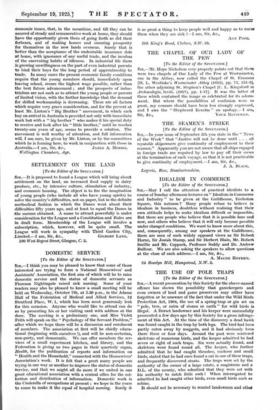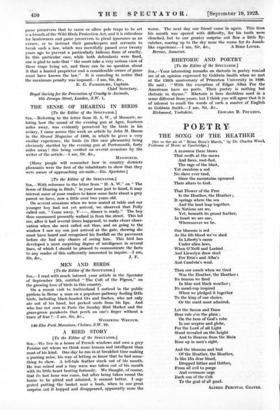THE USE OF POLE TRAPS
[To the Editor of the Sexcreroa.] SIR,—A recent prosecution by this Society for the above-named offence has shown the possibility that gamekeepers and even owners of land and game preservers may either have forgotten or be unaware of the fact that under the Wild Birds Protection Act, 1904, the use of a spring-trap or gin set on " pole, tree, or cairn of stones or earth " for wild birds is illegal. A Dorset landowner and his keeper were successfully prosecuted a few days ago by this Society for a gross infringe- ment of this Act. At the time of the discovery a dead hawk was found caught in the trap by both legs. The bird had been partly eaten away by maggots, and it had obviously been there three or four days. Around the post were scattered skeletons of numerous birds, and the keeper admitted he had seven or eight of such traps. Six were actually found, and skeletons were found round all. The keeper, who further admitted that he had caught thrushes, cuckoos and small birds, stated that he had once found a cat in one of these traps, and frequently discovered stoats. The traps were set by the authority of the owner of a large estate, a magistrate and a D.L. of the county, who admitted that they were set with his authority to catch little owls I When interrogated he admitted he had caught other birds, even small birds such as robins.
It should not be necessary to remind landowners and other game preservers that to cause or allow pole traps to be set is a breach of the Wild Birds Protection Act, and it is ridiculous for landowners and game preservers to plead ignorance as an excuse, or to instruct their gamekeepers and servants to break such a law, which was mercifully passed over twenty years ago to prevent a particularly hideous form of cruelty. In this particular case, while both defendants were fined, one is glad to note that " the court take a very serious view of these traps being set, and there can be no question about it that a landed proprietor and a considerable owner of game must have known the law." It is consoling to notice that the maximum penalty was imposed.—I am, Sir, &c., E. G. FAIRHOLME, Captain. Chief Secretary. Royal Society for the Prevention of Cruelty to Animals, 105 Jermyn Street, London, S.W. 1.











































 Previous page
Previous page